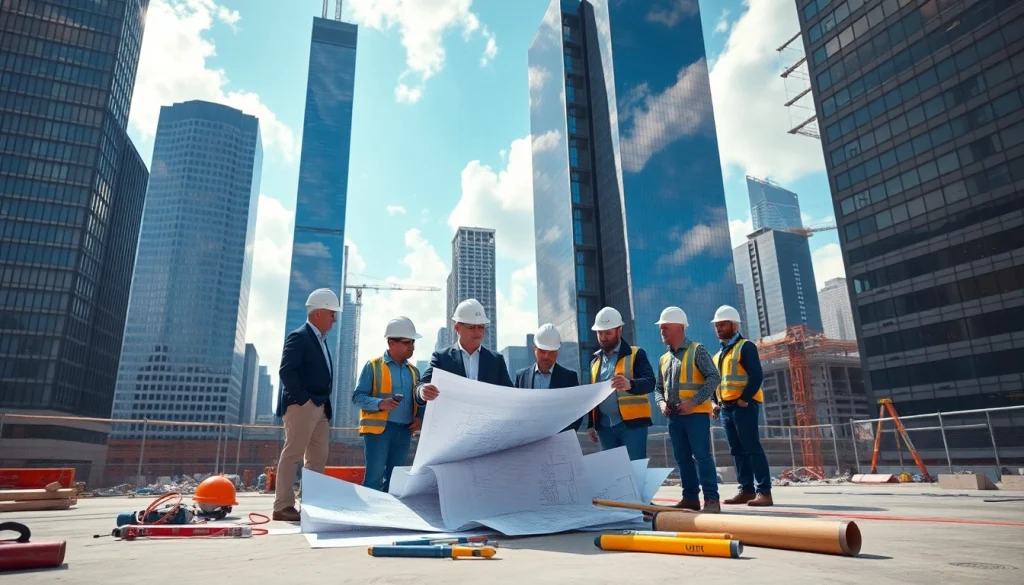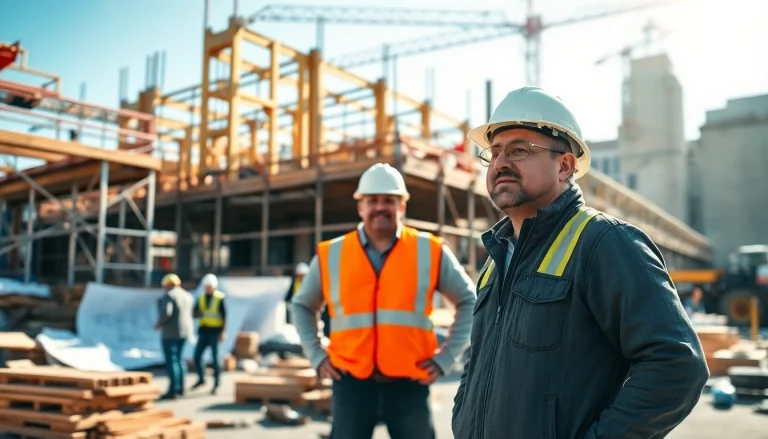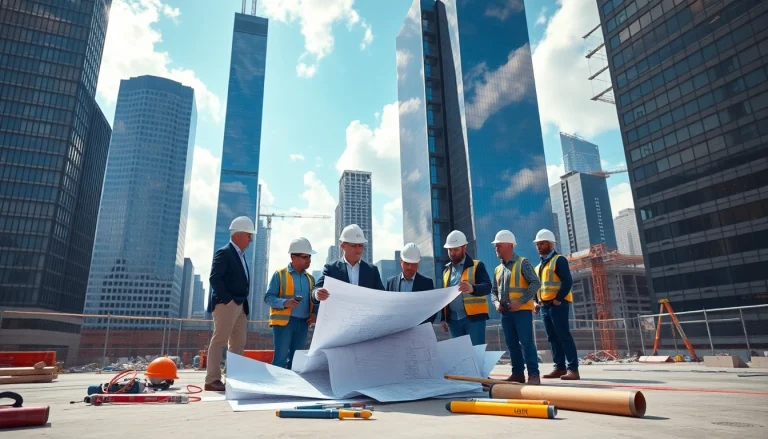
Understanding the Role of a New York Commercial General Contractor
When embarking on a construction project in New York, understanding the role of a New York Commercial General Contractor is crucial. These professionals act as the central hub of the construction process, ensuring that all components of a project come together efficiently and effectively. From overseeing the day-to-day operations to managing subcontractors and suppliers, their contribution to the success of a project cannot be overstated.
Responsibilities of a General Contractor
The responsibilities of a general contractor (GC) in New York City are numerous and multifaceted. They serve as the primary point of contact between the client and all parties involved in the construction process. Key responsibilities include:
- Project Management: GCs are responsible for planning, executing, and closing projects. This includes creating timelines, managing budgets, and ensuring adherence to building codes and regulations.
- Hiring Subcontractors: A GC must vet and hire subcontractors for specialized tasks, such as electrical work, plumbing, and HVAC installations.
- Procurement of Materials: Sourcing quality materials that meet project specifications while adhering to budget constraints is another critical task.
- On-Site Supervision: Ensuring that work proceeds according to plan involves regular site inspections and coordination meetings with subcontractors.
- Communication: A GC must keep all stakeholders informed, including clients, architects, and city officials, maintaining transparency throughout the process.
Importance of Licensing and Insurance
In New York, general contractors must be licensed and insured to protect both themselves and their clients. Licensing ensures that contractors meet industry standards and uphold legal requirements. Insurances, such as liability and worker’s compensation, safeguard against potential financial losses resulting from accidents or damages on the job site. Having both a valid license and sufficient insurance coverage should be non-negotiable criteria when hiring a contractor.
How General Contractors Coordinate Complex Projects
The complexity of commercial construction projects in New York requires adept coordination and collaboration among numerous entities. General contractors utilize various strategies to manage these complexities, including:
- Scheduling Software: Utilizing project management tools helps streamline scheduling, allowing contractors to track timelines and deadlines easily.
- Regular Meetings: Frequent coordination meetings with subcontractors and suppliers ensure that everyone is aligned with the project goals and timelines.
- Conflict Resolution: Skilled GCs proactively identify potential conflicts and take preemptive action to resolve them before they escalate.
Evaluating New York Commercial General Contractor Options
Choosing the right contractor for a project is not a decision to be taken lightly. Various factors come into play when evaluating potential New York Commercial General Contractors. Here are some critical aspects to consider:
Criteria for Selecting a Contractor
When assessing contractors, consider the following criteria to ensure that you choose a reliable partner:
- Reputation: Research the contractor’s reputation in the industry through reviews, testimonials, and past projects. A contractor with a solid reputation indicates reliability and quality.
- Specialization: Look for contractors that specialize in the type of work your project requires, whether that be retail spaces, office buildings, or industrial facilities.
- Local Knowledge: A contractor familiar with New York’s regulations, codes, and building practices will have a significant advantage in navigating the complexities of the city.
Assessing Experience and Expertise
Experience is an essential factor when evaluating potential contractors. Review their portfolio to understand the scope and quality of their previous work. Factors to consider include:
- Years in Business: A contractor with a long track record is likely to have encountered and surmounted many challenges.
- Expertise in Project Types: Specific experience in your project’s type can be a significant advantage.
Understanding Cost Structures
Every contractor will present different cost structures based on their methods, philosophy, and market positioning. Understanding these costs will help you make an informed decision. Key considerations include:
- Bid Methodology: Understand how contractors bid—are they providing a flat fee, time and materials, or project-based pricing? Each method has its own implications for your budget.
- Inclusions: Ensure you know what is included in the quoted price, such as project management fees, materials, and labor.
Interviewing Potential New York Commercial General Contractors
Once you have identified potential candidates for your construction project, interviewing them is the next vital step. A well-structured interview can provide important insights into their capabilities and compatibility with your project’s requirements.
Key Questions to Ask During the Interview
When interviewing candidates, consider asking the following questions to gauge their expertise:
- What is your experience with similar projects?
- Can you provide references from previous clients?
- How do you approach project management and timelines?
- What steps do you take to ensure quality control?
- How do you handle unforeseen issues or changes during construction?
Red Flags to Watch For
Just as there are positive attributes to look for, certain red flags may signal potential issues with a contractor:
- Lack of Communication: If a contractor is slow to respond or does not provide clear answers during the interview, it can indicate future communication issues.
- Pressure Tactics: Be cautious of contractors who pressure you into making quick decisions or signing contracts without ample time for consideration.
- Vague Financial Proposals: A credible contractor should provide clear and detailed quotes; vagueness can lead to unexpected costs down the line.
Requesting Quotes and Proposals
After the initial interviews, requesting detailed proposals will help you compare contractors on equal footing. Ensure that each proposal includes:
- Detailed breakdown of costs associated with the project.
- Proposed timelines and milestones for completion.
- Inclusions and exclusions clearly stated for better understanding.
Contractual Agreements with New York Commercial General Contractors
Once a contractor has been selected, drafting and signing a formal agreement is critical to protect both parties and ensure mutual understanding of the project scope.
Key Components of Construction Contracts
A robust construction contract should include the following components:
- Scope of Work: A clear description of the tasks to be performed, including specifications and plans.
- Payment Terms: Detailed information on the payment schedule, including deposits, milestones, and final payments.
- Timeline: Clearly defined start and completion dates, along with penalties for delays, if applicable.
- Change Order Procedures: Outline how any changes to the scope of work will be handled, including process and pricing adjustments.
Negotiating Terms for Best Results
Negotiation is an integral part of coming to an agreement with your contractor. Here are some strategies to consider:
- Research Comparisons: Understand industry standards to strengthen your bargaining position.
- Be Clear and Firm: Clearly communicate your needs and project requirements during negotiations.
- Seek Win-Win Outcomes: Strive for compromises that will lead to satisfaction for both parties.
Understanding Change Orders and Additional Costs
Change orders are common in construction and can significantly impact budgets. Here’s how to navigate this aspect:
- Document Everything: Ensure that any changes are documented formally in the form of change orders, detailing the revised costs and timelines.
- Communicate Early: If changes arise, communicate with your contractor as soon as possible to mitigate additional costs.
Managing Your Project With a New York Commercial General Contractor
Effective project management is vital for a successful construction endeavor. Once your contractor is on board and the project is underway, consider the following strategies to ensure everything moves smoothly.
Communication Tips for Successful Outcomes
Open lines of communication between you and the contractor are essential. Maintain routine check-ins, be available for questions, and promptly address concerns. Establishing a clear communication channel can significantly enhance collaboration throughout the project.
Monitoring Progress and Quality Assurance
Regularly assess the progress of the work against the agreed timelines and quality standards. This can involve:
- Site Visits: Schedule regular site visits to observe work progress personally.
- Quality Checks: Implement quality assurance checks to ensure that work aligns with project specifications.
Final Inspection and Handover Steps
Upon project completion, a thorough final inspection is necessary to ensure everything has been completed to satisfaction. Steps include:
- Conduct a walk-through with your contractor to spot any outstanding issues.
- Ensure all required documentation, such as warranties and permits, are provided.
- Agree on any necessary follow-up work or corrections that need addressing.
In summary, selecting and working with a New York Commercial General Contractor involves numerous steps and considerations that can significantly impact the success of your project. By carefully evaluating your options, asking the right questions, and maintaining open communication, you can ensure a smooth construction process and successful outcome.



